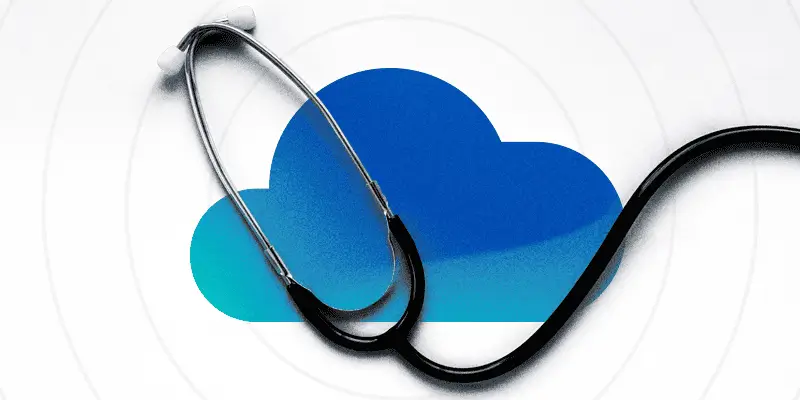The steps you take today are either going to help or hurt your chances of remaining secure and compliant in the new year.
Why It Matters: Healthcare companies are among the most highly targeted industries for data theft, and Salesforce is your single largest data repository.
- The FBI put out a press release late last year warning healthcare workers of widespread fraud schemes.
- Ransomware threats keep growing, posing massive challenges to both healthcare companies and their patients.
- Failing to properly protect sensitive data can result in costly fines and penalties for falling out of compliance with data security regulations.
Here are 10 Salesforce data security support factors every healthcare company must consider:
Audit Existing Salesforce Data Security Systems
Analyze Available Metrics
Utilize Firewalls
Provide Updated Cybersecurity Training
Maintain a Complete Data Backup and Recovery Plan
Enact Strict Access Control Measures for Protected Health Information
Mandate Strong, Continually Updated Passwords
Update and Enforce Proper Permissions Settings
Stress the Importance of Bug-Free Updates and Applications
Continually Monitor Your Systems

1. Audit Existing Salesforce Data Security Systems
It’s the start of the year. The processes and tools you put in place today will impact your ability to stay secure and meet your goals in 2023. Are you ready? The first step to figuring out how to move forward is to analyze the successes and challenges of your current Salesforce data security strategy.
Meet with leaders from various departments and gather any available data to highlight issues that might have gone unnoticed in the previous year.
Use this information to build out a new data security strategy. This could include sourcing new tools or instituting new protocols. Then present the changes to team members and ensure broad awareness.
2. Analyze Available Metrics
Your current toolset is likely gathering data and metrics that highlight the efficacy of your system. Are bugs showing themselves in live environments? Are certain areas of your system misfiring? Are employees properly securing their devices and accounts?
Find, sort, and analyze access logs, failure rates, permission sets, and anything else that can be quantified.
This information furthers the knowledge gained through your system audit to provide a realistic snapshot of both how your system is performing and how it’s being used. You can’t fix errors if you don’t know they exist, and this full-circle approach will highlight areas for improvement.

3. Utilize Firewalls
Fortifying your system helps prevent cybercriminals from accessing sensitive data. Anti-virus protection and other mitigation techniques address threats that have already gained access to your system, but a firewall is a method of preventing threats to your Salesforce environment in the first place.
Healthcare companies often utilize a Local Area Network (LAN) to support their system. A firewall puts a barrier between the LAN and the internet to support data security.
The infrastructure surrounding your Salesforce environment provides essential support to keep sensitive data secure. Firewalls and on-premises hosting both protect your Salesforce environment by provided higher levels of control over who can access your network.
4. Provide Updated Cybersecurity Training
Phishing continues to be one of the most frequent ways cybercriminals gain access to a computer system. Healthcare employees who open the wrong email can open the door to data breaches, exposure, and outages. The good news is this can be addressed and usually prevented with a little intentional communication.
Updated training must be provided to all team members to ensure their ability to spot and avoid phishing attempts and malware.
Hackers are becoming more sophisticated in their attempts to trick employees. Spoofing the email address of a known colleague is a popular way to convince someone to click on something they shouldn’t. Alert your employees to these types of attacks through continued training.
5. Maintain a Complete Data Backup and Recovery Plan
Healthcare companies caught without the proper data protection systems in place are subject to steep fines and penalties for failing to comply with regulatory requirements. Continued access to system and personal data is a major requirement not only for compliance, but for beneficial service to customers.
A continuously updated data backup must be maintained along with the ability to quickly and sufficiently restore your data after an outage.
It’s impossible to guarantee connectivity. Accidents happen. Maintaining an effective data backup and recovery plan is a critical consideration every healthcare company must address.

6. Enact Strict Access Control Measures for Protected Health Information
Healthcare companies are trusted with their patients’ most sensitive information. This goes beyond names, addresses, and credit card numbers to specific information regarding their health. Allowing healthcare workers to collect this information takes trust. Therefore, it’s the responsibility of each medical institution to utilize every available measure to protect it.
The Salesforce environment must be configured so that only those who need access to protected information in order to perform their jobs are the ones who have it.
An accidental deletion can have wide-ranging effects, including the loss of access to essential data. Granting people access to data—and the ability to edit it—when they don’t actually need it unnecessarily amplifies the potential for costly losses.
7. Mandate Strong, Continually Updated Passwords
If this Salesforce data security tip seems rudimentary, that’s because you’ve been hearing it since the very first time you made an account on the internet. Strong passwords are a must, and they should be changed on a regular cadence.
Login screens are your first line of defense against hackers, but their methods of bypassing your security methods are becoming increasingly sophisticated.
Guessing a password has become much easier with the help of automation. Every employee should be required to change their passwords with regular frequency—at least once every 90 days. Users should also include a string of letters, numbers, and symbols without using a pattern.
8. Update and Enforce Proper Permissions Settings
Salesforce offers a few tools to assign employee permissions: profiles, permission sets, and roles. However, many healthcare companies run into problems when they assign these settings without taking the time to properly configure them.
Salesforce’s layered security model relies on users personalizing these considerations. Failing to do so can result in overexposing information.
The first step is to ensure everyone with current access has the correct levels. This can be done manually but will take a long time depending on how many people are on your team. It’s highly recommended to automate this process with a policy scanner. From there, every new team member will need to be configured with these points in mind.
9. Stress the Importance of Bug-Free Updates and Applications
Salesforce has grown in popularity as a development platform, and for good reason. However, the benefits of Salesforce can be expanded by incorporating intentional DevOps tools. This leads to fewer errors and more secure applications and updates.
Buggy applications have the potential to create back doors for cybercriminals. An optimized development pipeline catches these vulnerabilities before they become a threat.
Tools like static code analysis and CI/CD instill multiple levels of automated testing throughout the application lifecycle. This reduces manual touchpoints and increases the quality of the code that makes up the eventual product.
10. Continually Monitor Your Systems
Salesforce data security is not a one-time consideration. Cybercriminals are constantly adapting their techniques and becoming more sophisticated. Your data security strategy must also be continually evolving and refined.
Healthcare companies continue to be among the most highly targeted industries for cybercrime due to the inherent sensitivity of data stored within these systems.
Continuous monitoring of analytics and metrics is essential to recognize vulnerabilities before they’re exploited. Remaining one step ahead of threats requires staying on top of trends and warning signs: reviewing access logs, analyzing deployment issues, and conducting data security training practices.
Your patients, your team members, and your bottom line all depend on maintaining a successful Salesforce data security strategy.

Next Step…
Salesforce DevSecOps is the best way to consistently produce reliable updates and applications. But how do you get started with this approach?
Check out our ebook, “Ripping the Band-Aid: A Guide to Getting Started with Healthcare DevSecOps in Salesforce” to learn how.
